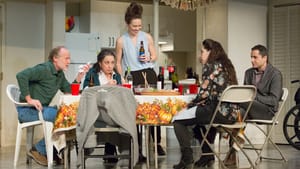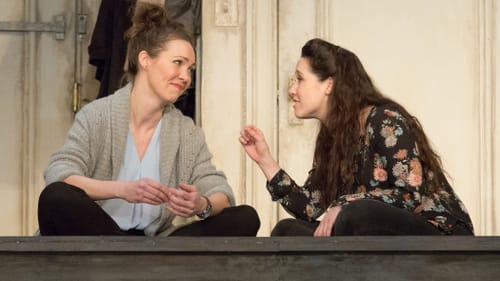Stay in the Loop
BSR publishes on a weekly schedule, with an email newsletter every Wednesday and Thursday morning. There’s no paywall, and subscribing is always free.
A little too human
Walnut Street Theatre presents Stephen Karam's 'The Humans'

Stephen Karam’s much-ballyhooed The Humans has finally reached Philadelphia, in a lavishly detailed production at Walnut Street Theatre. I’ll understand if you leave the supremely unhappy Thanksgiving dinner at its center wondering what caused all the fuss.
A contemporary spin on kitchen sink dramas of yore, The Humans attained a level of success matched by few contemporary works: a Tony Award for Best Play, a Pulitzer Prize nomination, and a profitable yearlong run on Broadway. Karam’s portrait of one struggling family’s fraught holiday gathering clearly speaks to those who see elements of their own kin in the Blake clan’s quietly desperate lives.
I imagine the sense of recognition may be even more palpable here, given the local connections embedded in the script. The Blakes make their home in Scranton, and references to Philly — positive and negative — are legion.
Disasters by the dozen
As its faux-profound title suggests, Karam strains to paint a realistic picture of hardscrabble 21st-century American existence. Paterfamilias Erik (Greg Wood) labored as a high-school janitor for three decades to provide a better future for his daughters Brigid (Alex Keiper) and Aimee (Jennie Eisenhower). “You have to really love your kids to spend your life picking up after other people’s,” he tells Brigid’s boyfriend, Richard (Ibrahim Miari, who does his best in an underdeveloped role).
Matriarch Deirdre (Mary Martello), too, is proud she’s worked for the same company since graduating from high school, though her younger, college-educated colleagues outearn her five to one. She lovingly cares for her ill mother-in-law (Sharon Alexander, displaying remarkable subtlety), unironically calling the situation “a blessing.” Together, Erik and Deirdre represent a vanishing baby-boomer mentality that stands in sharp contrast to their children’s free-spirited way of life.
These particulars could make for a familiar but compelling entry in an oversaturated genre. But under Bernard Havard’s plodding direction, The Humans comes across as a compendium of domestic clichés, juxtaposed with an almost comical number of heavy themes.

Felled by economic anxiety, 9/11, dementia, depression, disease, and a literal dark night of the soul, the Blakes may just be the unluckiest family to ever draw breath. That, or Karam’s lofty ambitions drove him straight into a dramaturgical ditch.
Humans as metaphor
Parsing each contrivance would require a dissertation-length review, and some features of the play genuinely work. In several places, Karam smartly uses crosstalk to build a convincing familial rapport. The Blakes are bickerers, with a specific patois communicating layers of meaning beneath seemingly benign speech. Just watch Brigid wince whenever Deirdre subtly introduces the subject of religion.
However, the character development is less precise. Despite compelling work from Keiper, Brigid — an aspiring composer who shuns her family’s small-town values — never transcends the stereotype of an ungrateful child blissfully unaware of her parents’ struggles. Even after Erik drops a few significant bombshells, Brigid seems primarily concerned with how each revelation will affect her. At least she’s given more depth than Aimee, who’s defined by her ulcerative colitis and lesbianism.
Wood convincingly sketches Erik’s struggle under the weight of generational and societal responsibility — details Martello’s smart performance also supports. Mary Folino’s costumes, however, look too high-toned for a proudly working-class couple. The play strikes its most authentic balance when it explores the psyche of this rapidly aging pair who feel their comfortable life slipping away.
But other elements are flimsy. A subplot placing Erik and Aimee in New York on September 11, 2001, introduced and quickly abandoned, exists only to add weight to a thin story. And the suggestion of the supernatural in Brigid’s creaky, crumbling Chinatown apartment — rendered by Roman Tatarowicz, with eerie lighting from Shon Causer — seems hackneyed rather than unsettling. The entire device puts too fine a point on Erik’s final, mood-shattering disclosure; it’s literally a metaphor come to life.
That is the true problem with The Humans. Although Karam reaches for the mantle of the Lomans and Tyrones — those foundational families of American stage realism — the Blakes more closely resemble the Antrobuses, the all-encompassing everyfamily from Thornton Wilder’s great satire The Skin of Our Teeth. It’s too much and not enough, all at once.
What, When, Where
The Humans. By Stephen Karam, Bernard Havard directed. Through March 4, 2018, at the Walnut Street Theatre, 925 Walnut Street, Philadelphia. (215) 574-3550 or walnutstreetheatre.org.
Sign up for our newsletter
All of the week's new articles, all in one place. Sign up for the free weekly BSR newsletters, and don't miss a conversation.

 Cameron Kelsall
Cameron Kelsall